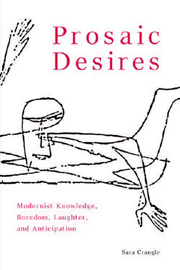Introduction: Mortal Self, Infinite Longings
Published online by Cambridge University Press: 12 September 2012
Summary
To begin: two disastrous tales of desires neither prosaic nor strictly modernist. Both arise in lesser- known novels by Thomas Hardy, books dedicated to an examination and excoriation of the most prevalent desires of Victorian fiction, namely, social mobility and love. The first is Hardy's The Hand of Ethelberta (1876), which centers on Ethelberta Chickerel, one of ten children born to a butler. While working as a governess, Ethelberta marries into the wealthy family she works for, but loses her husband to fatal illness on their honeymoon. Under agreement that she never publicize her humble origins, she is taken under the wing of her new mother- in- law, who disapproves of Ethelberta's published poetry and so bequeaths her only the lease of a London residence at her death. Ever enterprising, Ethelberta feigns nobility in this residence, hires her siblings as staff, and determines to find a husband who will support her family in the style to which she would like them to become accustomed, although they appear quite blissfully impoverished. The rest of the novel is consumed with the pursuit by various aspirants to Ethelberta's beautiful, and beautifully played, hand; Hardy busies himself throughout satirizing the transparencies of lower- and upper- class aspiration. Amidst the all- pervading longing for success, Ethelberta stands out as a figure “with a white round neck as firm as a fort,” in possession of a gift of self- command so powerful as to make her life distinctly uncomfortable, if undeniably interesting (63).
- Type
- Chapter
- Information
- Prosaic DesiresModernist Knowledge Boredom Laughter and Anticipation, pp. 1 - 27Publisher: Edinburgh University PressPrint publication year: 2010



